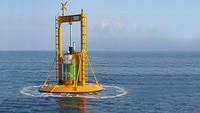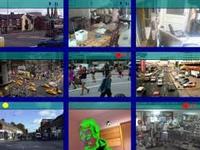-
China Security 2012 October meeting rescheduled to early December
The China International Exhibition on Public Safety and Security 2012, or Security China 2012, was scheduled for 22-25 October; the Chinese Communist Party 18thComngress Meeting is scheduled for mid-October; the Chinese authorities have asked organizers of all major October events in Beijing to reschedule their events to avoid security and logistical conflicts, so Security China 2012 has been rescheduled for 3-6 December
-
-
Next generation of advanced climate models needed
From farmers deciding which crops to plant next season, to mayors preparing for possible heat waves, to insurance companies assessing future flood risks, to those responsible for infrastructure protection having to decide how best to use scarce resource to mitigate climate change-induced disasters, an array of stakeholders from the public and private sectors rely on and use climate information; the U.S. National Research Council says he U.S. collection of climate models should advance substantially to deliver more detailed, smaller scale climate projections
-
-
Wireless window sentinel sends alerts if window is open
Window contacts tell users whether a window is open or closed; typically, such sensors are wire-based; scientists working with industry partners recently developed a new system that operates without wires or batteries; it draws its power from its environment: from sunlight and ambient heat
-
-
Airbus unveils its 2050 vision for “Smarter Skies”
Global aircraft manufacturer Airbus the other day released the latest installment of the Future by Airbus, its vision for sustainable aviation in 2050 and beyond; the vision looks beyond aircraft design to how the aircraft is operated both on the ground and in the air in order to meet the expected growth in air travel in a sustainable way
-
-
DHS funds more tests of autonomous power buoy for ocean surveillance

Ocean Power Technologies (OPT) has entered into an agreement with DHS Science & Technology Directorate to perform a new round of in-ocean tests on the company’s Autonomous PowerBuoy to demonstrate its use for ocean surveillance
-
-
Cloud OS for the U.S. intelligence community
Cloud management specialist Adaptive Computingis partnering with the investment arm of the CIA, In-Q-Tel, to develop a cloud operating system for use by U.S. intelligence agency
-
-
Innovative hydroelectric solution harvests power from water flowing through municipal pipes
An innovative solution has made it so dams do not have to be built in order to get hydroelectricity; hydroelectric power can now be harvested from water flowing through municipal pipes; the innovation is creating energy by using existing infrastructure, as well as solving a problem in that infrastructure
-
-
Law-enforcement agencies eager for Web-surveillance tools

Private technology firms are pitching software capable of analyzing large swaths of the Internet to local law enforcement looking for ways to stop the next mass shooting or domestic terrorist event before it happens; police departments hope the software will help them detect online information from terrorists, traffickers, pedophiles, and rioters
-
-
Many of the U.S. 20 million manholes are in need of immediate rehabilitation or replacement

The EPA estimates that there are about twenty million manholes in the United States – or one manhole for every 400 feet of pavement on average; many of those manholes are in serious decay or in need of immediate rehabilitation or replacement
-
-
Testing new pavement materials
Scientists are trying to determine the durability of recycled materials for use in road construction; a Texas university is building a new accelerated pavement testing center, with the overall road pad at the accelerated pavement testing center could be a little bigger than a half-acre in size
-
-
MIT expert: “toxic” political discussions limit climate response
In a talk at the Sandia National Lab, an MIT expert says the inability of natural and social scientists to convince political leaders that “we’re spinning a roulette wheel over climate change” puts humanity at “extreme risk,” and that the difficulties in using science to push for mitigation strategies are more political than scientific
-
-
As shoe-scanning devices fail, passengers continue to remove their shoes

In the last five years the U.S. government has tested several scanning devices for detecting explosives and other weapons concealed in the shoes of airline passengers; after spending millions of dollars on these devices, TSA has concluded that the detection systems are ineffective; the result: removing shoes at security check points is going to be a part of air travel for the foreseeable future
-
-
In China, corruption blamed for collapse of bridges
Since 2011 eight bridges have collapsed in China, according to the state run media, including the Yangmingtan Bridge in the city of Harbin last November; the bridge was almost 10-mile long and construction was originally estimated to take three years, but workers finished it in half the time; when the bridge collapsed, the first thing on people’s mind was corruption
-
-
Safety & Security Asia 2012 is back for its second edition in Jakarta, Indonesia
Safety & Security Asia (SSA 2012) is back for its second edition in Jakarta, Indonesia; foreign investors have been pumping in close to $19.3 billion into the Indonesia’s market – this fact, and the fact that the Indonesian government and business remain aware of the threat of terrorism, create a an opportunity for security companies; SSA 2012 aims to help businesses explore these opportunities
-
-
U.S. demand for security products to rise 7.3 percent annually through 2016
The U.S. market for security products is expected to increase 7.3 percent per year to $21 billion in 2016; ongoing technological improvements that enhance the accuracy, ease of use, and speed of operation of electronic security systems will bolster spending, not only by fueling interest in upgrading existing security systems but also by improving market penetration
-
More headlines
The long view
Factories First: Winning the Drone War Before It Starts
Wars are won by factories before they are won on the battlefield,Martin C. Feldmann writes, noting that the United States lacks the manufacturing depth for the coming drone age. Rectifying this situation “will take far more than procurement tweaks,” Feldmann writes. “It demands a national-level, wartime-scale industrial mobilization.”
Trump Is Fast-Tracking New Coal Mines — Even When They Don’t Make Economic Sense
In Appalachian Tennessee, mines shut down and couldn’t pay their debts. Now a new one is opening under the guise of an “energy emergency.”
Smaller Nuclear Reactors Spark Renewed Interest in a Once-Shunned Energy Source
In the past two years, half the states have taken action to promote nuclear power, from creating nuclear task forces to integrating nuclear into long-term energy plans.
